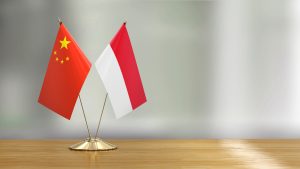Indonesia’s President Joko “Jokowi” Widodo is scheduled to meet with China’s supreme leader Xi Jinping today in Beijing, on the first stop in a three-nation tour of East Asia that is designed to bolster Indonesia’s presidency of the G-20 economic grouping.
The Indonesian leader arrived in Beijing last night, ahead of the first in-person meeting with Xi since the Winter Olympics in February. It is also the first time since the early months of the COVID-19 pandemic that Beijing has individually hosted a visiting head of state in Beijing. After today’s meeting with Xi, Jokowi will depart for Japan and South Korea for talks with their respective leaders on July 27 and July 28.
Indonesian Foreign Minister Retno Marsudi told reporters last week that while in Beijing, Jokowi would also meet Chinese premier Li Keqiang, and that the agenda of his East Asian tour would center around trade and investment.
“As we know, these three countries are Indonesia’s strategic partners in the economic field. And these three countries are also strategic partners of Indonesia and ASEAN when we talk about regional issues,” she said, Channel News Asia reported. “The focus of the visit is to discuss strengthening economic cooperation, particularly in the areas of trade and investment.”
Since taking office in 2014, Jokowi has looked to China to bolster his domestic economic agenda, which centers around attracting foreign investment and improving the internal connectivity of the wide-flung Indonesian archipelago. China is the country’s largest trade partner – two-way trade reaching $110 billion last year – and Retno pointed out to reporters last week that it is the third largest investor in Indonesia, with a total investment value of around $3.2 billion in 2021.
All this makes China a potentially key source of foreign investment for the construction of the new capital Nusantara on the island of Borneo, Jokowi’s legacy project, which the government hopes will begin construction next month, in order to begin moving government offices by the end of Jokowi’s second term in 2024. One observer says the visit is also likely to see discussions about the high-speed rail project linking the capital Jakarta and Bandung, which involves Indonesian and Chinese state-owned enterprises, but which has been dogged by delays.
Jokowi’s outreach to China reflects the careful balance of economic opportunity and strategic imperatives that has characterized his approach to the country. Recent Beijing-Jakarta relations have not been without their tensions, particularly in the South China Sea, where parts of Indonesia’s Exclusive Economic Zone are bisected by China’s maximalist “nine-dash line” maritime claim. Last week, Indian media reported that the Indonesian navy was in advanced talks for the acquisition of the potent BrahMos supersonic anti-ship missile, following a series of standoffs between the two nations in recent years.
More broadly, the overriding motive for the East Asian tour is the G-20 Summit in November. Indonesia currently holds the annual presidency of the economic forum, but its agenda has been strained by the invasion of Ukraine by Russia, a member of the grouping. Jokowi has invited Russian President Vladimir Putin to the G-20 Summit in Bali in November, courting tensions with the Western G-20 members and threatening to derail Indonesia’s focus on economic cooperation and recovery from the COVID-19 pandemic. If Jokowi is to keep his economic agenda on track, support from China, Japan, and South Korea will be crucial. (Xi is also expected to break his two-year COVID-19 isolation to attend the summit, potentially after securing a third term in office at this year’s National Congress of the Chinese Communist Party.)
The G-20 presidency and the complications posed by the Russia-Ukraine war have prompted an unusual flurry of diplomatic activity by Jokowi, who is not known to take a particular interest in foreign affairs. These have included his visits to Germany and Russia, both G-20 members, and Ukraine, the latter the first by an Asian leader since the Russian invasion.
While it may be tempting to interpret this flurry of overseas visits, including this week’s East Asian tour, as a sign of new diplomatic activism on the part of Indonesia’s leader, the guiding star of his globe-trotting continues to be domestic concerns: keeping the G-20 presidency on track, securing food exports from Ukraine, and securing much-needed foreign investment. As ever, the domestic enjoys primacy in Jokowi’s approach to foreign affairs.

































